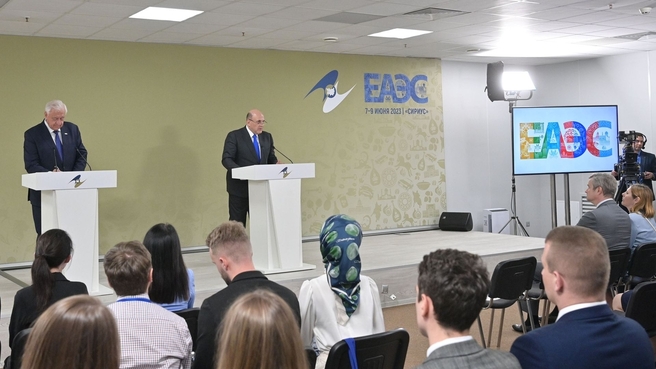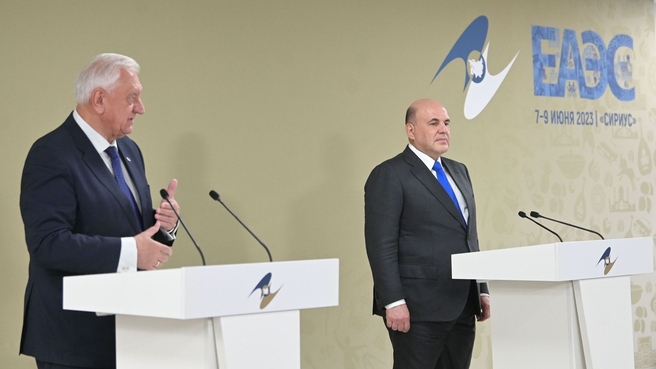From the transcript:
Mikhail Mishustin: Friends, good afternoon.
Sochi is hosting two important events at this time. In fact, there are more than two events, but two of them stand out in terms of significance. They are within the scope of the Eurasian Intergovernmental Council and the Council of Heads of Government of the Commonwealth of the Independent States. We have also had a large number of person-to-person meetings with attendees at today’s forums, fruitful conversations at the 2nd Youth Forum, and we have all spoken to young people from the CIS and other friendly nations.
I am confident that the decisions we have taken and the proposals we have made will contribute greatly to deepening cooperation in our region.
Allow me to comment
in more detail on the meeting of the Intergovernmental Council.
We, together with the heads of governments of the five member states, covered
an agenda filled with numerous issues, focusing especially on matters related
to our development and integration. We talked over the priorities of Russia’s
chairmanship outlined by Russian President Vladimir Putin in his message to the
five members states.
The breadth of participation in our meetings highlights a serious and growing interest in our Union. With our partners, we are clear-eyed that we need to stand together to face challenges in today’s world. Our response to these challenges will be to expand cooperation in all areas, launch new state-of-the-art production in strategically significant industries, exchange cutting-edge technology and innovation, and form new chains of added value.
Sochi is currently hosting a display of joint initiatives ‘Eurasia is our Home’. I hope that you, our esteemed media, have gone to see it. There is a large number of projects, and they are being implemented thanks to close cooperation between our countries.
This close cooperation is needed to ensure the technological, economic, and financial sovereignty of our countries. By pooling our expertise and resources we can produce high-quality products on par with the West.
In order to make sure there continues to be an increasing number of these projects, we will give significant support to cooperation and the launch of a funding mechanism at the level of the Union. Mr Myasnikovich, we have agreed on this. It will come into operation at the start of next year. We are drafting regulations for this purpose. We constantly emphasise in our communication with our esteemed colleagues, commission ministers that this needs to be our priority.
As part of its Chairmanship of the bodies of the Eurasian Economic Union, Russia, together with its partners, is continuing its work on all of the major areas of our integration.
We discussed implementing the schedule of priority measures to digitalise rail transportation. It is of utmost importance to the strengthening of our trade and economic cooperation both within the Union and with our foreign partners, in particular with the People’s Republic of China.
In April, an Agreement on the use of electronic navigation seals came into force. We have just scheduled the testing of such a mechanism. Our focus is on establishing a single seamless transit system for goods in order to streamline business operations, speed up cross-border transportation, and improve traceability.
We paid special attention to the initiative of Russian President Vladimir Putin to create an independent rating agency in Eurasia. Such organisations assess the creditworthiness of financial institutions or states. We believe it important for our Union to have such a structure. Its economy is growing, and, of course, we need a transparent and efficient analytical tool.
Speaking of another new area, today we signed an agreement on mutual recognition of academic degrees in our five states. Their holders can now work freely in their professional areas throughout the Union. This is a very important decision. Mr Myasnikovich, I would like to thank you and all our colleagues who worked on it. Previously, people needed confirmation of their degrees and had to go through a number of bureaucratic procedures, which differed severely in terms of duration and complexity depending on the specialty, country, or university. It wasn't easy.
This decision will provide a tremendous stimulus for the exchange of talent between our countries. And in general, we are removing another obstacle, another barrier to the free movement of goods, services, labour and capital.
I would like to also mention the climate agenda, which is the focus of attention of the Eurasian Intergovernmental Council.
Not only developed, but also developing countries are now implementing carbon regulation and introducing green financing tools and supporting various technologies in this area.
China, for example, has a national and several regional emissions trading schemes. Indonesia and Thailand are now creating similar mechanisms. Pakistan and Vietnam have announced comparable plans. Of course, it is impossible to stand on the sidelines.
Kyrgyzstan, Kazakhstan and Russia have already set goals to achieve carbon neutrality. To achieve them, we need to implement the appropriate strategies that have been adopted. We believe that work on the climate agenda is a basic condition for the further development of each of our states and for the Eurasian Union as a whole.
Allow me to say a few more words about international cooperation.
Trade relations of the Union with our external partners are developing at a fast pace. There is a whole set of agreements, which we discussed in detail today with our partners, including cooperation with Vietnam, Iran, and Serbia, with more countries surely joining this group in the near future.
Negotiations to create a free trade zone with Egypt, Indonesia, and the United Arab Emirates are already underway. We are successfully advancing on this track with Iran. This will be beneficial, opening up additional advantages for businesses in our countries and enhancing our trade volumes.
Tomorrow we will continue working with our colleagues in the five members states. We will take part in the plenary session of the 3rd Eurasian Congress. I think you will also find it interesting.
I want to thank you all for your attention, for covering the work and all the events that have been taking place in Sochi over these two days. Thank you.
Mr Myasnikovich, go ahead, please.
Mikhail Myasnikovich: Thank you very much.
I would like to thank Prime Minister Mishustin for his chairmanship and for the comprehensive approach that enabled us to deliver on the items included in the Intergovernmental Council’s agenda which, of course, had long been overdue.
At the Supreme Council meeting on 25 May, the heads of state not only assessed the state of affairs in the Eurasian Economic Union, but also put forward specific tasks to expand the scope of our cooperation and new initiatives.
The Intergovernmental Council that took place really provided for comprehensive work on all of these tasks. And here, of course, a huge role was played by the Government of the Russian Federation and, of course, specifically Mr Mishustin. The Intergovernmental Council and the exhibition are not just a demonstration, so to speak, of some smart and good things. These are real integration projects. They show the role and capabilities of each of our states.
You should have seen the faces of our company representatives as they exhibited their products, which are already real and functional things. They also showcased certain projects for the future.
A very powerful meeting was held within the framework of the Youth Forum. For example, I got a lot of pleasure from the fact that it was not just words being spoken but specific projects being proposed by young people that we, as a commission, together with the member states, will do everything possible to implement. The involvement of young people in integration is very important. This is a generational bond, and it will be secured. Therefore, Mr Mishustin, thank you very much for this.
Overall, we have signed 14 documents as part of the Intergovernmental Council. Once again, I want to mention that this year our industry has already achieved a cumulative growth of more than 100 percent: 100.9 percent for the first four months, to be exact, and I think this trend will continue. Rural areas added 3.1 percent. At the same time, the volume of trade with third countries increased by 20 percent. This indicates the great potential of the economies of the Eurasian Economic Union. Even despite the difficulties created by Western sanctions, we really can produce and trade, and these products are competitive both domestically, and internationally.
In the fourth quarter of last year (there was a little rumble in the press on this), the heads of government decided to eliminate all 11 barriers still in place in mutual trade at that time. I would like to inform you that the Governments have succeeded. Eight out of 11 have already been completely eliminated and there is a high degree of readiness on the remaining three, which I think will be dealt with in the near future.
I think that the matters related to the integrated information system will also be resolved. Today, we have 52 common processes, this year we will add 19 more, and we will have a full-fledged information exchange between governments, and between businesses and governments.
Thank you.
Mikhail Mishustin: Friends, thank you very much and I wish you success with your further coverage.














